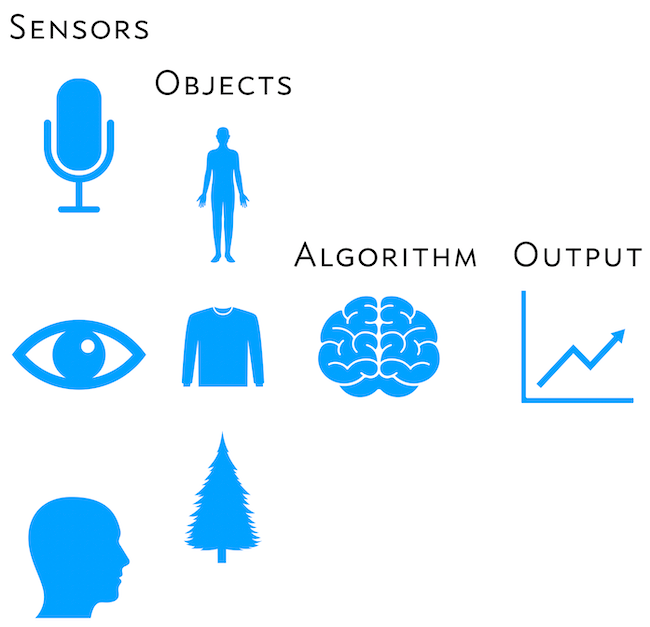Sensors + Algorithms Are the New Camera

Don’t call them cameras or microphones anymore. Those are human-centric names, and humans are about to be the Neandertals of detection.
I first heard this idea regarding cameras from Benedict Evans.
What we’re moving towards is a world where sensors are everywhere—and of multiple types:
Visible light
Non-visible light
Radio waves
Sound
Vibration
Chemicals
Radioactivity
Air pressure
Etc, etc.
These sensors will be sold as single units that can be deployed at scale by cities and companies, and they’ll be installed in everyday objects like buildings, street lights, sidewalks, park benches, restaurants, corporate workplaces, walls, ceilings, vehicles, etc.
In the past we would have had giant teams of humans looking at all this data. Well actually, we wouldn’t have been able to deploy them because there aren’t enough people to look at the data. But now we can—because of algorithms.
The combination of sensors and algorithms is about to become the most important tool for corporate and civic management.
Algorithms watch 24/7. They never get tired. They can update automatically across the entire world that’s using them. They can constantly improve based on new data. And they will be able to combine information from multiple sensor types into insights that we could never produce as humans.
Here are some examples of the types of things we’ll be able to do:
Measure the pharemones and body language in a room to estimate the chance of a fight breaking out.
Scan the way people are walking to determine if they’re likely carrying weapons.
Watch facial expressions and listen to voices to determine the current emotional state of various people.
Watch people’s body language, combined with body scans, combined with facial recognition, combined with their entire background, to determine their threat level in public places.
Scan everything about a public area to determine its current danger level, who the most dangerous people are, who should be controlled first if authorities arrived, where the best vantage points are for police, etc.
These probably seem scary to you, but they’re coming. My role is to make you aware, not to tell you it’ll all be ok.
And there will be positive, consumer-focused versions of these things too—like finding the best place to propose, the best place to go for a hike based on visibility and temperature and foot traffic.
The possibilities for companies’ efficiency, for city management, for optimizing consumer experiences—are nearly endless.
Everything starts with data, and that’s what these sensors will provide. They’ll tell us the current state of the world at any given moment—with more sensors in more places (and better capabilities and sensitivity) giving us even more data freshness and resolution.
That data will be fed constantly into millions of algorithms working continuously to provide various types of value—to different audiences. Some sensors will be publically available, but many will be restricted by a government or corporation for official use.
If you think this will dramatically affect privacy, you’re right.
Privacy in the future will not be about whether someone has your data—it’ll be about whether the right people have it, and are being careful with it.
That your data is out there will be a given.
Anyway, the next time you look at a camera, think about how primitive it is. The idea of a sensor that only takes one kind of input for review by a human. A human that sleeps and defecates and gets bored and distracted.
Sensors of the future are mutli-dimensional and linked directly to algorithms that continuously interpret the inputs.
The interesting thing about this is that the hardware doesn’t need to be upgraded that often. Or, at least for quite some time, most of the upgrades to the sensor and algorithm pairing will come from improvements to the algorithms.
You may think that I’m a bit to bullish on this prolific sensor stuff, and that I’m ignoring the Black Mirror abuse cases that can potentially come from them.
I’m not. I’m not ignoring them.
I see this going both ways—Black Mirror and also a far more advanced Star Trek. And I’m pulling for the latter.
Either way we can’t stop what’s coming.
AI reminds me a lot of the gun debate in that way. We don’t want dangerous people to have it, but if people are solid then it won’t matter if they do.
A healthy and kind society can have these tools (see weapons) and not cause harm, but the moment something goes sideways the opportunity will rise for abuse. And at that point you don’t want the power-hungry teenager to have insights to everyone’s location, personal preferences, etc.
Just get ready. That’s what I’m saying.
Cameras and mics become sensors. Algorithms replace the humans on the other end. And the sensors will be deployed everywhere.
You’re going to be able to look at a city center scene and see unbelievable things using this technology. Millions of algorithms parsing thousands of inputs from multiple perspectives, and then creating analysis and visualizations for human decision-makers (in addition to the automated choices that will be done without any intervention at all).
It’s coming. Get ready.